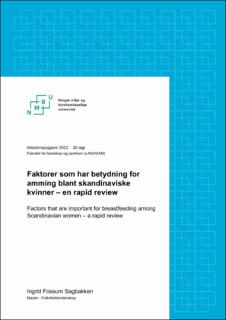| dc.contributor.advisor | Kjøllesdal, Marte Karoline Råberg | |
| dc.contributor.author | Sagbakken, Ingrid Fossum | |
| dc.coverage.spatial | Scandinavia | en_US |
| dc.date.accessioned | 2022-07-11T12:11:33Z | |
| dc.date.available | 2022-07-11T12:11:33Z | |
| dc.date.issued | 2022 | |
| dc.identifier.uri | https://hdl.handle.net/11250/3004545 | |
| dc.description.abstract | Morsmelk er den beste maten for barnet, og kan ha en positiv effekt på immunforsvaret. Det er ønskelig å opprettholde og øke andelen i befolkningen som ammer. Målet med denne oppgaven er å kartlegge faktorer som har sammenheng med amming og dermed oppnå en forståelse for hva som påvirker amming blant skandinaviske kvinner. På bakgrunn av dette er problemstillingen: "Hvilke faktorer er det som har betydning for amming blant skandinaviske kvinner?".
Denne masteroppgaven baserer seg på en litteraturstudie. Rapid review ble ansett som en egnet metode for å kartlegge faktorer som kunne belyse tematikken og besvare problemstillingen innenfor de rammene som var gitt. Litteratursøket ble gjennomført i databasene Ovid Medline, Embase og Cinahl. Referansene ble gjennomgått og sortert etter forhåndsbestemte kriterier, før artikler som ble ansett som relevante for problemstillingen ble valgt ut for analyse og syntese.
Litteratursøket resulterte i 708 treff og totalt 20 inkluderte artikler. Artiklene baserte seg på studier med både kvantitativt og kvalitativt design. Funnene er sortert med utgangspunkt i den sosiale helsemodellen, og etter identifiserte tema. Resultatene fra denne masteroppgaven antyder at ulike sosiale, kulturelle og miljømessige forhold påvirker hvorvidt kvinner ammer eller ikke, samt varigheten av denne. Blant disse er kvinnens utdannelsesnivå, alder, etnisitet og kulturell bakgrunn, og om hun er førstegangsfødende eller ikke. Holdninger til ammingen, sosial støtte og støtte fra helsepersonell kan også ha betydning. Det samme gjør kunnskap om amming og hvorvidt man er komfortabel med å amme i offentligheten.
Sosiale, kulturelle og politiske forhold, levekår og individuelle sosioøkonomiske faktorer har betydning for amming blant skandinaviske kvinner. Sosiale nettverk og støtte, og individuelle faktorer synes å ha vesentlig betydning. I folkehelsearbeid er det viktig å ha kjennskap til disse faktorene. Det er behov for ytterligere forskning på sammenhenger mellom amming og individuelle livsstilsfaktorer. | en_US |
| dc.description.abstract | Breast milk is the ideal food for an infant and can have a positive effect on its immune system. It is desirable to maintain and increase the proportion of the population who breastfeed. The purpose of this thesis is to map factors that have an impact on breastfeeding and thus gain an understanding of the underlying factors affects breastfeeding among Scandinavian women. On this basis, the research question is as follows: "What factors are important for breastfeeding among Scandinavian women?".
This master's thesis is based on a literature review. Rapid review was considered a suitable method for mapping factors that could shed light on the topic and answer the question within the framework of the thesis. Data collection was conducted in the databases Ovid Medline, Embase and Cinahl. The references were reviewed and sorted according to predetermined criteria, before articles that were considered relevant to the problem were selected for further analysis and subsequently synthesized.
The literature search resulted in 708 results and a total of 20 included articles. The articles were based on studies with both quantitative and qualitative design. The findings are sorted according to the social health model, and by identified topics. The results of this master's thesis indicate that there is a multitude of social, cultural, and environmental conditions that affect whether women breastfeed or not, as well as the duration of this. Among these are the woman's level of education, age, ethnicity, and cultural background, and whether she is a first-time mother or not. Attitudes towards breastfeeding, social support and support from health professionals can also have an impact. The same goes for knowledge about breastfeeding and whether one is comfortable breastfeeding in public.
Social, cultural and political conditions, as well as living conditions and individual socio- economic factors are important for breastfeeding among Scandinavian women. Social networks and support, and individual factors seem to be of significant importance. In public health work it is important to have a strong understanding of these factors. There is a need for further research on the relationship between breastfeeding and individual lifestyle factors. | en_US |
| dc.language.iso | nob | en_US |
| dc.publisher | Norwegian University of Life Sciences, Ås | en_US |
| dc.rights | Attribution-NonCommercial-NoDerivatives 4.0 Internasjonal | * |
| dc.rights.uri | http://creativecommons.org/licenses/by-nc-nd/4.0/deed.no | * |
| dc.title | Faktorer som har betydning for amming blant skandinaviske kvinner : en rapid review | en_US |
| dc.title.alternative | Factors that are important for breastfeeding among Scandinavian women : a rapid review | en_US |
| dc.type | Master thesis | en_US |
| dc.description.localcode | M-FOL | en_US |

